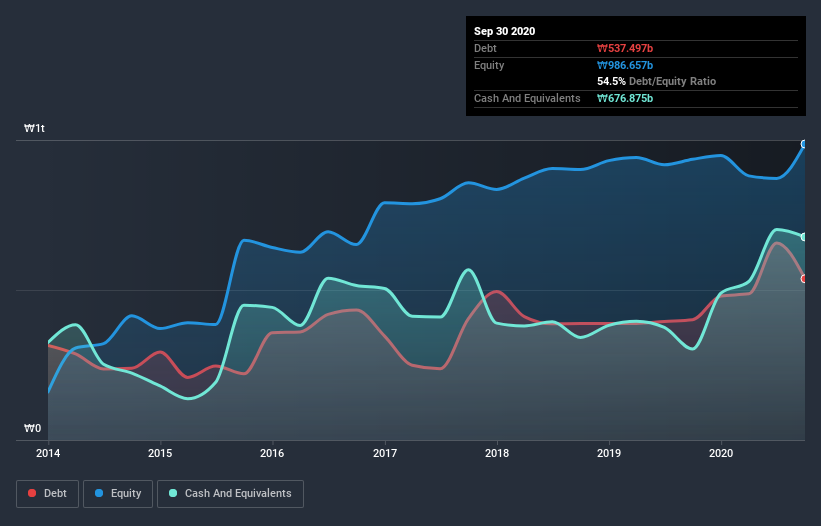- South Korea
- /
- Machinery
- /
- KOSE:A017800
Here's Why Hyundai Elevator (KRX:017800) Can Manage Its Debt Responsibly

Warren Buffett famously said, 'Volatility is far from synonymous with risk.' When we think about how risky a company is, we always like to look at its use of debt, since debt overload can lead to ruin. Importantly, Hyundai Elevator Co., Ltd (KRX:017800) does carry debt. But should shareholders be worried about its use of debt?
When Is Debt Dangerous?
Debt is a tool to help businesses grow, but if a business is incapable of paying off its lenders, then it exists at their mercy. In the worst case scenario, a company can go bankrupt if it cannot pay its creditors. While that is not too common, we often do see indebted companies permanently diluting shareholders because lenders force them to raise capital at a distressed price. Of course, the upside of debt is that it often represents cheap capital, especially when it replaces dilution in a company with the ability to reinvest at high rates of return. The first step when considering a company's debt levels is to consider its cash and debt together.
See our latest analysis for Hyundai Elevator
What Is Hyundai Elevator's Net Debt?
The image below, which you can click on for greater detail, shows that at September 2020 Hyundai Elevator had debt of ₩531.1b, up from ₩400.9b in one year. But on the other hand it also has ₩676.9b in cash, leading to a ₩145.8b net cash position.

How Healthy Is Hyundai Elevator's Balance Sheet?
Zooming in on the latest balance sheet data, we can see that Hyundai Elevator had liabilities of ₩848.7b due within 12 months and liabilities of ₩669.0b due beyond that. Offsetting these obligations, it had cash of ₩676.9b as well as receivables valued at ₩208.0b due within 12 months. So it has liabilities totalling ₩632.8b more than its cash and near-term receivables, combined.
Hyundai Elevator has a market capitalization of ₩1.64t, so it could very likely raise cash to ameliorate its balance sheet, if the need arose. However, it is still worthwhile taking a close look at its ability to pay off debt. Despite its noteworthy liabilities, Hyundai Elevator boasts net cash, so it's fair to say it does not have a heavy debt load!
Also good is that Hyundai Elevator grew its EBIT at 12% over the last year, further increasing its ability to manage debt. The balance sheet is clearly the area to focus on when you are analysing debt. But it is future earnings, more than anything, that will determine Hyundai Elevator's ability to maintain a healthy balance sheet going forward. So if you're focused on the future you can check out this free report showing analyst profit forecasts.
Finally, a business needs free cash flow to pay off debt; accounting profits just don't cut it. While Hyundai Elevator has net cash on its balance sheet, it's still worth taking a look at its ability to convert earnings before interest and tax (EBIT) to free cash flow, to help us understand how quickly it is building (or eroding) that cash balance. Over the last three years, Hyundai Elevator reported free cash flow worth 6.0% of its EBIT, which is really quite low. For us, cash conversion that low sparks a little paranoia about is ability to extinguish debt.
Summing up
Although Hyundai Elevator's balance sheet isn't particularly strong, due to the total liabilities, it is clearly positive to see that it has net cash of ₩145.8b. On top of that, it increased its EBIT by 12% in the last twelve months. So we are not troubled with Hyundai Elevator's debt use. There's no doubt that we learn most about debt from the balance sheet. But ultimately, every company can contain risks that exist outside of the balance sheet. For instance, we've identified 1 warning sign for Hyundai Elevator that you should be aware of.
Of course, if you're the type of investor who prefers buying stocks without the burden of debt, then don't hesitate to discover our exclusive list of net cash growth stocks, today.
If you decide to trade Hyundai Elevator, use the lowest-cost* platform that is rated #1 Overall by Barron’s, Interactive Brokers. Trade stocks, options, futures, forex, bonds and funds on 135 markets, all from a single integrated account. Promoted
Valuation is complex, but we're here to simplify it.
Discover if Hyundai Elevator might be undervalued or overvalued with our detailed analysis, featuring fair value estimates, potential risks, dividends, insider trades, and its financial condition.
Access Free AnalysisThis article by Simply Wall St is general in nature. It does not constitute a recommendation to buy or sell any stock, and does not take account of your objectives, or your financial situation. We aim to bring you long-term focused analysis driven by fundamental data. Note that our analysis may not factor in the latest price-sensitive company announcements or qualitative material. Simply Wall St has no position in any stocks mentioned.
*Interactive Brokers Rated Lowest Cost Broker by StockBrokers.com Annual Online Review 2020
Have feedback on this article? Concerned about the content? Get in touch with us directly. Alternatively, email editorial-team@simplywallst.com.
About KOSE:A017800
Hyundai Elevator
Designs, manufactures, installs, maintains, and modernizes elevators in South Korea and internationally.
Adequate balance sheet and slightly overvalued.
Market Insights
Community Narratives




